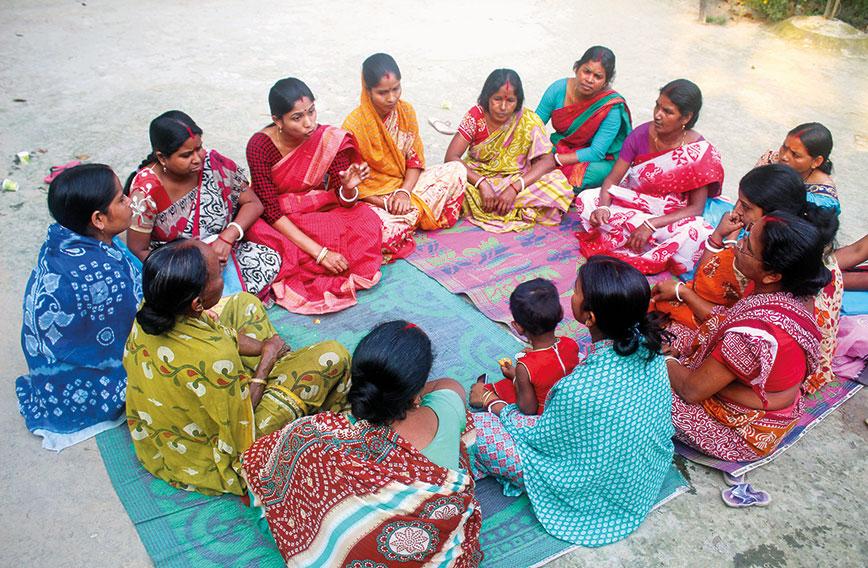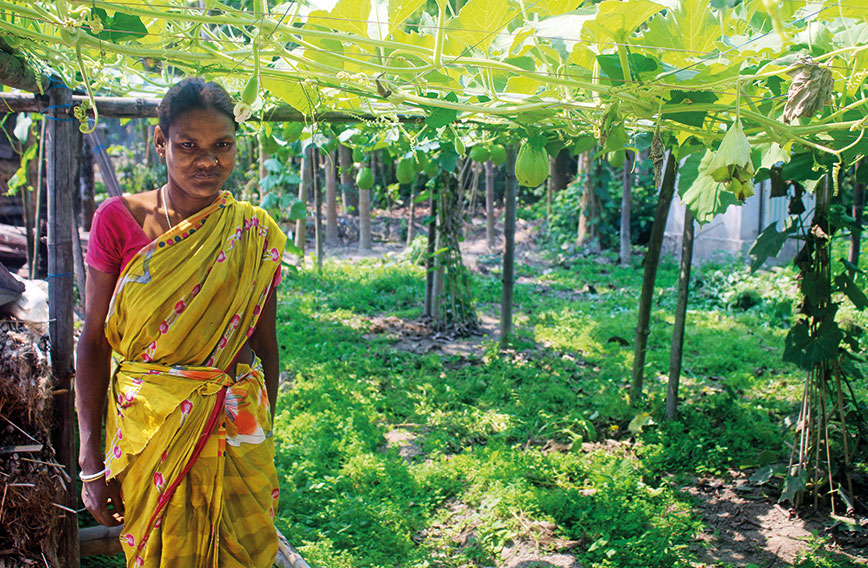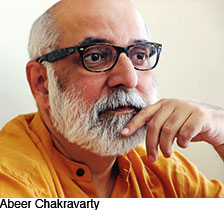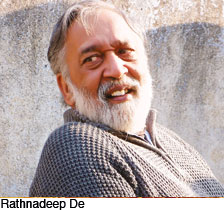
Trainers from AHEAD holding a meeting with families
AHEAD helps panchayats fill in the blanks
Subir Roy, Kolkata
The countryside in Jalpaiguri and Alipurduar districts of North Bengal, nudging the Bhutan hills, as winter fades, is as pleasant, pretty and accessible as it can get. As the hard-topped road gives way to country tracks, the small car moves on two parallel grass strips, with the beaten path in between used by humans and of course that great hardy blessing of modern living, the motorbike.
Two other gifts of modern technology underline both the change taking place in the countryside and what country folk now take for granted. Electricity came a couple of years ago and the dish antenna popping out of an occasional tin roof bears testimony to the farm family’s need for entertainment. The most recent addition is a little pucca toilet tucked into one corner of every courtyard. All these are in sharp contrast to the ancient farming technology — bullocks and plough — still being used.
Dulal Roy is a trainer in Salbani II gram panchayat of Dhupguri block in Jalpaiguri district and comes near the top of a pyramid. Under him is Sumitra Sarkar, who is an apprentice. (Apprentices are selected from women as that gives the programme better access to households.)
The two help 35 marginalised families make a dent in their poverty by connecting with various government schemes. Based on household survey data provided by AHEAD Initiatives, the families are chosen by the gram panchayat from the bottom 10 percent.
Combatting hunger
AHEAD was set up in 2009 under Section 25 of the Companies Act to work with panchayati raj institutions as well as small rural NGOs. The acronym stands for Addressing Hunger, Empowerment and Development.
Seeds and saplings from the gram panchayat are distributed to families to grow kitchen and nutritional gardens on their homestead land. They are helped to learn how to do vermicomposting and azolla cultivation.
Use of vermicompost is encouraged to avoid chemical fertilisers. Azolla, a fern that floats on water and is grown in shallow water tanks made out of plastic sheets, is a rich source of nutritional fodder for farm animals.
Families are also encouraged to grow “five fruits” (like papaya, amla, guava, pomegranate and lemon). This way, right at home, they have an affordable supply of all the fresh food and fodder that a rural family needs.
 A homestead garden with nutritious crops
A homestead garden with nutritious crops
Beyond fruits and vegetables, families are also helped to rear small animals like chicken, ducks, goats and pigs. Dwijen Roy’s homestead in Salbari I gram panchayat in Jalpaiguri district paints an idyllic rural picture with scooting poultry and bleating goats. Bimal and Bandani Bhagat in Madhya Khutimari village have made a success of rearing pigs. In their pens, these seem the most docile of creatures. Scared easily, all they seem to want to do is eat.
The novel part of the programme is introducing what is new in the region. The growing of capsicum and broccoli has caught on in a big way (they fetch a very good price in the market) and now there is a demand for the introduction of mushrooms.
Plus, ‘activity groups’ grow different types of dal like arhar and kalai on panchayat or roadside land with seeds given to them by the panchayat, something they could not do earlier because land and seeds were not available. A double innovation is to have a couple of rows of dal cultivation as bio fencing or boundary markers for plots.
There is also an afforestation scheme called Briksha Patta under the rural employment guarantee scheme (MGNREGA). The idea is to have families look after nurseries of saplings and in return get partial ownership of the saplings that survive. Under it, if 90 percent of saplings survive, the family gets Rs 10 per tree per month for three to five years, depending on the tree.
Through this a family is able to earn on average Rs 2,000 per month. Then (after maturity) when a tree is sold the family gets 75 percent of the proceeds and the gram panchayat 25 percent. But the minus point is that the success of the scheme has been varied.
The business model for the food and nutrition part of AHEAD’s work runs something like this. The gram panchayat hands over seeds and saplings to the trainer, who through the apprentices passes them on to the targeted families. They are helped to grow them. A part of the seeds are returned by the apprentices to the gram panchayat and the rest is sold by the families and apprentices. They also get paid by the day for the training they receive (which they pass on to the families).
The apprentices and the families eat better and have more cash because of what they can sell. The gram panchayat pays the trainers at the semi-skilled rate under MGNREGA which is reimbursed by AHEAD.
Some gram panchayats are now paying the trainers Rs 2,000 extra as they are found to be very useful. Payment to apprentices is also routed the same way, via the panchayat. There is no attempt to go beyond the panchayat while helping it.
Creative learning
Other than food and nutrition, the second major thrust area of AHEAD’s agenda is education. The star at the quarterly meeting of senior schoolteachers and gram panchayat education officials of Kalchini block of Alipurduar district is Somnath Sarkar, head teacher, Bamandas Smriti Primary School in Mendabari gram panchayat. He is a winner of the national award for teachers in 2016 and receives a round of applause as he gets up to speak.
Bengali-speaking himself, the first point he makes is that at the earliest level children should be allowed to freely use their own language, in many cases a tribal one like Santhali. Later, a middle-aged teacher corroborates the point and recalls how she had to make do with the Bengali medium when she herself was a beginner. This will make children speak fluently, never mind the grammar, and thus quickly pick up the language.
He recalls that when AHEAD came to work with the gram panchayat initially teachers had some hesitation and the gram panchayat made it clear that there was no imposition. But over the years trust has grown as AHEAD has emphasised things like the need to get out of the classroom, the overarching aim being to make learning joyful. A later visit to Sarkar’s school drives home the point. It is a noisy, happy school with the teachers making it a point to be accessible. Perhaps, most significantly, the level of dropouts is low.
AHEAD, which began in Kalchini block of Alipurduar district in 2012, is seeking to help the public education set-up through handholding and helping shape the school curriculum and supplement it. The aim is to enable young people to have skills to earn a living in their area, to promote “contextually appropriate education” by looking at local endowments, in part with provision for after-school learning and vocational training.
It offers help through its specialised inputs, in particular audio-visual modules, skills and man hours. The audio-visual programme is a great hit and school attendance is better on the day it is on the school timetable. The gram panchayat took a lead in imparting local history and information on local industry and one of the most successful events was a visit by the children to a tea factory. Despite being in the heart of tea country with numerous tea gardens lining highways, this was the first exposure of many to how tea is actually made ready for the teapot.
By far the greatest achievement of AHEAD in the field of education is the Srijan Mela that was started in Kalchini block in Alipurduar district in 2016. Its star attraction is the stalls and presentations that the children put up, thus encouraging and capturing their creativity. The inspector of schools for the block, Rajat Ranjan Ghosh, affirms that the Srijan Mela has been adopted by Alipurduar district (the district magistrate loved his visit to the mela) with a “vengeance” and the district administration is trying to take it to other gram panchayats.
What AHEAD is trying to do in education is not something entirely novel. Most of the ideas that it is working on to improve schooling outcomes through focus on areas like activity-based learning are contained in the National Curriculum Framework of 2005. But results obtained, exemplary in Kalchini, depend on the local resources available. AHEAD is pursuing the same agenda in Purulia district where a team was sent two years ago and recently a team has come from Purulia to Kalchini to see the progress being made there.
being a catalyst
AHEAD Initiatives is a bit different from many other civil society organisations which see a gap in, say, an area like healthcare or schooling and do their bit to add to the supply in these areas. Instead of actually engaging in delivery, AHEAD seeks to be a catalyst which tries to help and support panchayati raj institutions do better in helping the rural marginalised live better lives. In this it also seeks the help of the various technical departments of the government.
 Since 2009, AHEAD has remained focussed on panchayati raj institutions and local NGOs. AHEAD is headed by two 60-plus bearded gentlemen, Executive Chairman Abeer Chakravarty and Managing Director Rathnadeep De.
Since 2009, AHEAD has remained focussed on panchayati raj institutions and local NGOs. AHEAD is headed by two 60-plus bearded gentlemen, Executive Chairman Abeer Chakravarty and Managing Director Rathnadeep De.
Highly articulate and informed with global and professional exposure, they have over time come to focus on building a local self-governance model which the voluntary sector can use to aid development at the grassroots. Chakravarty has been with Bates CHI, a part of the global advertising and public relations group, WPP. De, an alumnus of Imperial College, London, was earlier an adviser to the West Bengal government on rural decentralisation.
 Chakravarty and De articulate the future along the following lines. “Through all that we do we are trying to devise what is replicable and scalable, evolve activity-based modules in education which try to bring together corporates and local government. Our dream is to have local NGOs who can promote PRI-corporate partnership so that local knowledge and corporate resources can be combined. Right now PRIs are somewhat alien to working with corporates. In the process we seek to redefine the role of voluntary organisations.”
Chakravarty and De articulate the future along the following lines. “Through all that we do we are trying to devise what is replicable and scalable, evolve activity-based modules in education which try to bring together corporates and local government. Our dream is to have local NGOs who can promote PRI-corporate partnership so that local knowledge and corporate resources can be combined. Right now PRIs are somewhat alien to working with corporates. In the process we seek to redefine the role of voluntary organisations.”
AHEAD works with 21 gram panchayats in three states in eastern India — mostly in West Bengal and also in Odisha and Jharkhand. It received initial support from organisations like British Petroleum, Rural Development Institute (now called LANDESA) and the Department of Science and Technology of the West Bengal government.
Most of the financial assistance on which it runs is contributed by iiINTERest, its Danish partner. This is a voluntary organisation which works for the betterment of the poor in developing countries by improving their livelihoods. Its chairman, Soren Jeppesen, a professor at the Copenhagen Business School, is a long-term friend and mentor.
AHEAD is able to work closely with officialdom because over the years the latter has found it useful. Rajesh Roy, executive assistant to Salbari II gram panchayat, frankly admits he was earlier “quite sceptical” about panchayat-civil society cooperation. But over time he has seen the cultivation of azolla, a new plant, become an “exemplary success”.
The same process has recurred as villagers have taken up the cultivation of other exotic vegetables like capsicum and broccoli which fetch a very good price. The panchayat trains the trainers, who in turn through the apprentices help the villagers learn how to cultivate the new items.
Dipankar Roy, the block development officer for Dhupguri block, is even more forthright. AHEAD, through a lot of brainstorming, has helped him “update” his information. In particular, the knowledge and technology for the cultivation of azolla, in an area where there is a shortage of green fodder, was very useful.
Roy admits that he himself tried to introduce azolla cultivation earlier when he was posted in the Darjeeling and Murshidabad districts, but didn’t succeed. Now it is ubiquitous in 16 gram panchayats in Dhupguri. It is the same story with vermicomposting. Or take the simultaneous cultivation of bay leaf and lemon in tea gardens.
AHEAD has acted as a link between the gram panchayat and the beneficiary focusing on the absorption of a new idea which eventually leads to behavioural change. He has a phrase for the whole process: "living side by side, you do what you see others doing".
AHEAD feels that where it is successful, this is partly because there is continuity of commitment in gram panchayats. Take the case of Mendabari gram panchayat in Alipurduar district’s Kalchini block where it started working when Abhijit Narjinari of the Congress was panchayat pradhan. He is still a panchayat member but today surrounded by Trinamool Congress members. But this does not affect his positive role. Bijoy Saiba, also a former pradhan and a current panchayat member, remains active and helpful. So is the present pradhan, Chandra Narjinari.
After the visit, two images abide. One is of pucca toilets everywhere, be it homesteads or schools. Sarkar, the prize-winning teacher, affirms that in his school the teachers and students clean the toilets. There is no designated cleaner for the toilets.
The other image is really a puzzle. Most of the people I meet to find out how the bottom 10 percent of the poor are being given a helping hand to emerge from poverty don’t look as if they are the absolute poor, barring the odd middle-aged tribal woman.
One explanation for this is that the condition of the families AHEAD works with in North Bengal is different from those of the adivasis it works with in Purulia district of West Bengal and Simlipal and Mayurbhanj districts of Odisha. North Bengal showcases two successful areas — Dhupguri block in food, nutrition and livelihood security; and the entire Kalchini block in supporting and supplementing mainstream education with local content and also helping youth develop skills.
Comments
-

Mohankumaravel - April 29, 2018, 9:50 p.m.
It is a unique effort.



